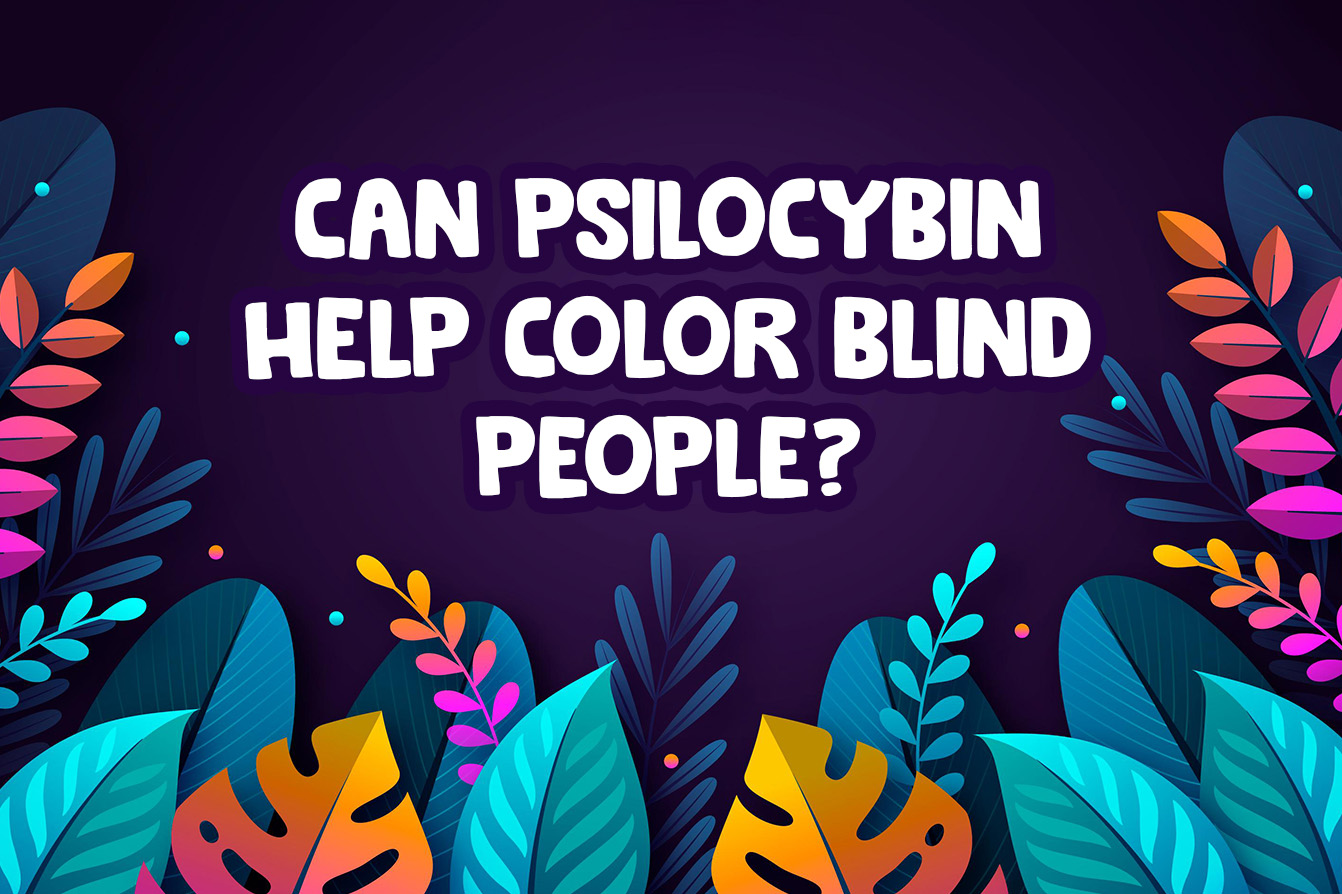
Can psilocybin help color blind people see color again?
This so-called psychedelic revolution that we find ourselves in brings with it a lot of interesting studies and perspectives. The current focus on much research being done is on the possible effects psychedelic substances on mental pr
This so-called psychedelic revolution that we find ourselves in brings with it a lot of interesting studies and perspectives. The current focus on much research being done is on the possible effects psychedelic substances on mental problems. But there are also researchers who choose to look at completely different things. And that's a good thing, as a new report published in Drug Science, Policy and Law suggests that some psychedelics may help improve the symptoms of color blindness.
Also read: Why San Pedro is one of the most remarkable plants on this planet
Life is a colorful place (for some)
Currently there is a very interesting new documentary by the legendary David Attenborough called Life in Color on Netflix. This documentary beautifully shows how people and animals view the world in color (or lack of color). For example, there are animals that see many more colors than we do, which produces beautiful images that are almost impossible for us to comprehend. We humans have pretty good sight as well, but people who are color blind see a lot less. Here you can take a fun test to see if you are partially color blind yourself. Small fact: many people themselves do not know that they are partially color blind.
But now some researchers seem to think that psychedelic substances such as psilocybin (magic mushrooms and magic truffles) and lysergic acid diethylamide (LSD) may help people with color blindness experience more color. Anecdotal and historical reports have long claimed that psychedelic drugs can change color vision, but really solid research has never been done on this.
In a previous study, Researchers JEC Anthony and colleagues received reports from participants describing changes in their color blindness symptoms after taking psychedelics. Motivated to investigate whether these types of experiences are common, the researchers analyzed responses to a large-scale annual drug survey - the 2017 edition of the Global Drugs Survey (GDS).
Also read: Dr. Robin Carhart-Harris publishes new promosing psilocybin study
Psilocybin and LSD: the most colorful substances of all
The survey included a question asking color-blind respondents to report whether their color perception had changed after using a psychedelic. The question yielded 47 responses that the researchers were able to categorize. Responses were almost evenly distributed - about half (23) of these respondents said they experienced improvements in color blindness after taking a psychedelic and about half (24) did not.
The substances most often cited for improving color blindness were LSD and psilocybin, although other substances were also reported. The study authors specify that "the responses did not indicate that a specific drug caused changes in color blindness at a greater frequency than other drugs."
While there weren't many responses to analyze, the researchers say there were enough to suggest that recreational use of psychedelic drugs can improve color blindness, at least in some users. There was also evidence that these improvements could extend further than the intoxication period. This was quite a large group, too: About 39% of those who experienced changes in color said these changes lasted from three days to years after using the substance.
Also read: Magic Mushrooms vs Depression: Scientists looking for test subjects
Improving neural plasticity
The exact reason why psychedelics can affect color vision is unclear, but the authors say it may have to do with the activity involving the 5-HT2A serotonin receptor. They say psychedelic agents such as LSD and psilocybin are known to activate the 5-HT2A receptor, which can lead to altered neural plasticity and allow new connections between cortical regions.
"Psychedelics can facilitate the experience of a wide spectrum of colors," suggest Anthony and colleagues. "In the excited psychedelic state, new communication between cortical regions can link new photisms with pre-existing color concepts, enabling a new color experience and improving color blindness."
oblems. But there are also researchers who choose to look at completely different things. And that's a good thing, as a new report published in Drug Science, Policy and Law suggests that some psychedelics may help improve the symptoms of color blindness.
Also read: Why San Pedro is one of the most remarkable plants on this planet
Life is a colorful place (for some)
Currently there is a very interesting new documentary by the legendary David Attenborough called Life in Color on Netflix. This documentary beautifully shows how people and animals view the world in color (or lack of color). For example, there are animals that see many more colors than we do, which produces beautiful images that are almost impossible for us to comprehend. We humans have pretty good sight as well, but people who are color blind see a lot less. Here you can take a fun test to see if you are partially color blind yourself. Small fact: many people themselves do not know that they are partially color blind.
But now some researchers seem to think that psychedelic substances such as psilocybin (magic mushrooms and magic truffles) and lysergic acid diethylamide (LSD) may help people with color blindness experience more color. Anecdotal and historical reports have long claimed that psychedelic drugs can change color vision, but really solid research has never been done on this.
In a previous study, Researchers JEC Anthony and colleagues received reports from participants describing changes in their color blindness symptoms after taking psychedelics. Motivated to investigate whether these types of experiences are common, the researchers analyzed responses to a large-scale annual drug survey - the 2017 edition of the Global Drugs Survey (GDS).
Also read: Dr. Robin Carhart-Harris publishes new promosing psilocybin study
Psilocybin and LSD: the most colorful substances of all
The survey included a question asking color-blind respondents to report whether their color perception had changed after using a psychedelic. The question yielded 47 responses that the researchers were able to categorize. Responses were almost evenly distributed - about half (23) of these respondents said they experienced improvements in color blindness after taking a psychedelic and about half (24) did not.
The substances most often cited for improving color blindness were LSD and psilocybin, although other substances were also reported. The study authors specify that "the responses did not indicate that a specific drug caused changes in color blindness at a greater frequency than other drugs."
While there weren't many responses to analyze, the researchers say there were enough to suggest that recreational use of psychedelic drugs can improve color blindness, at least in some users. There was also evidence that these improvements could extend further than the intoxication period. This was quite a large group, too: About 39% of those who experienced changes in color said these changes lasted from three days to years after using the substance.
Also read: Magic Mushrooms vs Depression: Scientists looking for test subjects
Improving neural plasticity
The exact reason why psychedelics can affect color vision is unclear, but the authors say it may have to do with the activity involving the 5-HT2A serotonin receptor. They say psychedelic agents such as LSD and psilocybin are known to activate the 5-HT2A receptor, which can lead to altered neural plasticity and allow new connections between cortical regions.
"Psychedelics can facilitate the experience of a wide spectrum of colors," suggest Anthony and colleagues. "In the excited psychedelic state, new communication between cortical regions can link new photisms with pre-existing color concepts, enabling a new color experience and improving color blindness."









